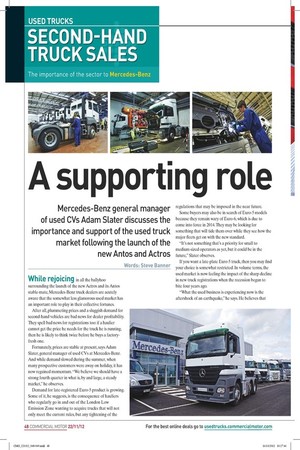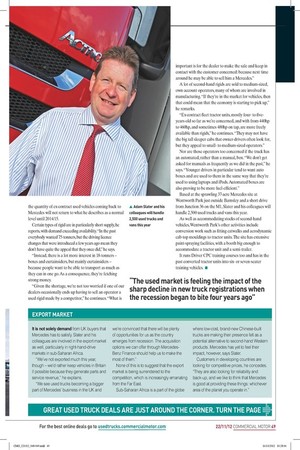A supporting role
Page 39

Page 40

If you've noticed an error in this article please click here to report it so we can fix it.
Mercedes-Benz general manager of used CVs Adam Slater discusses the importance and support of the used truck market following the launch of the new Antos and Actros
Words: Steve Banner While rejoicing in all the ballyhoo surrounding the launch of the new Actros and its Antos stable-mate, Mercedes-Benz truck dealers are acutely aware that the somewhat less glamorous used market has an important role to play in their collective fortunes.
After all, plummeting prices and a sluggish demand for second-hand vehicles are bad news for dealer profitability. They spell bad news for registrations too: if a haulier cannot get the price he needs for the truck he is running, then he is likely to think twice before he buys a factoryfresh one.
Fortunately, prices are stable at present, says Adam Slater, general manager of used CVs at Mercedes-Benz. And while demand slowed during the summer, when many prospective customers were away on holiday, it has now regained momentum. “We believe we should have a strong fourth quarter in what is, by and large, a steady market,” he observes.
Demand for late-registered Euro-5 product is growing. Some of it, he suggests, is the consequence of hauliers who regularly go in and out of the London Low Emission Zone wanting to acquire trucks that will not only meet the current rules, but any tightening of the regulations that may be imposed in the near future.
Some buyers may also be in search of Euro-5 models because they remain wary of Euro-6, which is due to come into force in 2014. They may be looking for something that will tide them over while they see how the major fleets get on with the new standard.
“It’s not something that’s a priority for small to medium-sized operators as yet, but it could be in the future,” Slater observes.
If you want a late-plate Euro-5 truck, then you may find your choice is somewhat restricted. In volume terms, the used market is now feeling the impact of the sharp decline in new truck registrations when the recession began to bite four years ago.
“What the used business is experiencing now is the aftershock of an earthquake,” he says. He believes that the quantity of ex-contract used vehicles coming back to Mercedes will not return to what he describes as a normal level until 2014/15.
Certain types of rigid are in particularly short supply, he reports, with demand exceeding availability. “In the past everybody wanted 7.5-tonners, but the driving licence changes that were introduced a few years ago mean they don’t have quite the appeal that they once did,” he says.
“Instead, there is a lot more interest in 18-tonners – boxes and curtainsiders, but mainly curtainsiders – because people want to be able to transport as much as they can in one go. As a consequence, they’re fetching strong money.
“Given the shortage, we’re not too worried if one of our dealers occasionally ends up having to sell an operator a used rigid made by a competitor,” he continues. “What is important is for the dealer to make the sale and keep in contact with the customer concerned: because next time around he may be able to sell him a Mercedes.” A lot of second-hand rigids are sold to medium-sized, own-account operators, many of whom are involved in manufacturing. “If they’re in the market for vehicles, then that could mean that the economy is starting to pick up,” he remarks.
“Ex-contract fleet tractor units, mostly fourto fiveyears-old so far as we’re concerned, and with from 440hp to 460hp, and sometimes 480hp on tap, are more freely available than rigids,” he continues. “They may not have the big tall sleeper cabs that owner-drivers often look for, but they appeal to smallto medium-sized operators.” Nor are those operators too concerned if the truck has an automated, rather than a manual, box. “We don’t get asked for manuals as frequently as we did in the past,” he says. “Younger drivers in particular tend to want auto boxes and are used to them in the same way that they’re used to using laptops and iPods. Automated boxes are also proving to be more fuel-efficient.” Based at the sprawling 37-acre Mercedes site at Wentworth Park just outside Barnsley and a short drive from Junction 36 on the M1, Slater and his colleagues will handle 2,500 used trucks and vans this year.
As well as accommodating stocks of second-hand vehicles, Wentworth Park’s other activities include conversion work such as fitting catwalks and aerodynamic cab-top mouldings to tractor units. The site has extensive paint-spraying facilities, with a booth big enough to accommodate a tractor unit and a semi-trailer.
It runs Driver CPC training courses too and has in the past converted tractor units into sixor seven-seater training vehicles. n
EXPORT MARKET
It is not solely demand from UK buyers that Mercedes has to satisfy. Slater and his colleagues are involved in the export market as well, particularly in right-hand-drive markets in sub-Saharan Africa.
“We’ve not exported much this year, though – we’d rather keep vehicles in Britain if possible because they generate parts and service revenue,” he explains.
“We see used trucks becoming a bigger part of Mercedes’ business in the UK and we’re convinced that there will be plenty of opportunities for us as the country emerges from recession. The acquisition options we can offer through MercedesBenz Finance should help us to make the most of them.” None of this is to suggest that the export market is being surrendered to the competition, which is increasingly emanating from the Far East.
Sub-Saharan Africa is a part of the globe where low-cost, brand-new Chinese-built trucks are making their presence felt as a potential alternative to second-hand Western products. Mercedes has yet to feel their impact, however, says Slater.
Customers in developing countries are looking for competitive prices, he concedes. “They are also looking for reliability and back-up, and we like to think that Mercedes is good at providing these things: whichever area of the planet you operate in.”










































